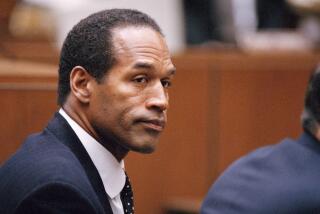PERSPECTIVE ON BLACK AMERICA : We Become Whom We Emulate : Children must be taught that the true heroes are not sports celebrities but people who meet the challenges of real life.
- Share via
In the past year, a lot has been said about the deep racial divisions facing our nation. We have talked about the national tragedy facing the black community: children gunning one another down in the streets, and our men turning to drugs and crime. We either complained or cheered the acquittal of O.J. Simpson and we debated whether a bigoted man should lead a march of a million men. Far too many people believe that these images represent the reality of being black in America.
As a black man, this perception leaves me angry, saddened and frustrated. Although my anger and frustration go beyond the fallout from the Simpson trial and the “Million Man March,” these two events illustrate the collective lack of discretion exercised as we choose where to focus our attention. For more than a year and a half, we have been glued to our television sets, fascinated by the downfall of a man once considered by many to be a role model. That fact in and of itself makes me shudder. Being gifted with athletic ability makes one worthy of recognition; it does not make one a role model.
We should be choosing our role models “by the content of their character.” As a nation, we were not doing that in 1963 when Dr. Martin Luther King spoke those words and we are not doing it now. We must turn our attention away from those people with high visibility whose actions and words belie the bankrupt nature of their character.
Instead, let us look at all the good that is being done in our own backyards by the millions of black individuals who have a stake in the future of this country; we must teach our children the values those people represent.
Every day, in any given community, there are hundreds of decent black Americans who provide real opportunities for creating and sustaining hope for the future. These are not the heroes who offer hope with promises of winning the lottery, becoming a rap star or pulling down backboards and endorsement contracts in the NBA. These are simply men and women who get up every morning and do the things that citizens do.
In Los Angeles, it’s the middle-aged male substitute teacher who mesmerizes a class of fourth-graders with a math concept. In Minneapolis, it’s the teenage boy who comes to the aid of an older white man who becomes ill on the street corner. In Chicago, it’s the mother in the Garfield Park neighborhood who raises and supports three children while going to school so she can get a better job. In Toledo, Ohio, it’s the single mother of four adopted children--three of whom have special needs--who nurtures, loves, raises and provides for them as her own. These people who are quiet heroes rarely receive mention on the evening news. But day after day, they are the true role models for children who may otherwise start to believe what they see on TV.
Yes, it is unrealistic to think that the media will stop covering the Simpsons and Farrakhans of the world. Sadly, popular culture dictates that sensationalism, wealth and extremism still take precedence over virtue and hard work. But how we choose to respond is up to each of us. We have the opportunity to influence our children’s choice of whom to look up to. We have the ability to recognize, celebrate and emulate the men and women in our communities whose qualities and actions create hope for young people. We simply have to decide whether we have the will to do so.
We are faced with a daunting task, one that requires our vigilance and care in defining success.
While it is necessary for everyone to exercise discrimination when choosing role models, it is especially important for communities of color. In spite of the strides we have made toward racial equality, there are still significantly fewer men and women of color in positions of power and authority, positions that children automatically look to when determining whom they want to be like.
We must make a commitment to work with children, not just to develop their hook shots or their throwing arms, but to develop their critical thinking abilities. We must show them that success comes and dreams are realized when they work hard and take the time to prepare for the challenges they will face. In addition, we must teach children discipline and responsibility. We must teach them by both word and example.
We need to talk openly and meaningfully about the growing gap in race relations. And we need to raise our standards--to expect and demand more of ourselves, our children and the media--so that we can discriminate between superficial heroes and genuine role models.
More to Read
Go beyond the scoreboard
Get the latest on L.A.'s teams in the daily Sports Report newsletter.
You may occasionally receive promotional content from the Los Angeles Times.










